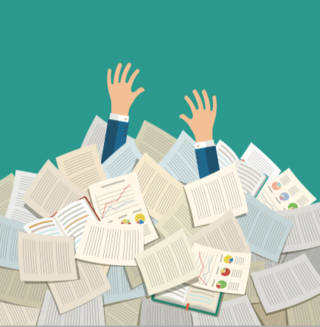Health
Is Information Overload Hurting Mental Health?
Endless access to information during COVID-19 might be making matters worse.
Posted June 4, 2020 Reviewed by Ekua Hagan

Unsurprisingly, given the severe nature of the threat of COVID-19 and the economic downturn we are facing, experts are now predicting that the next “epidemic” will be an epidemic of mental illness and suicide.
There are urgent calls to deal with the potential uptick in suicides. Nearly half (45%) of Americans are saying that their mental health has already been affected by the crisis. And while we don’t have a lot of information about the effects of something like the nationwide physical distancing measures we have seen, we do know from prior research that large-scale disasters and emergencies have led to high rates of mental health problems across the population.
It seems pretty clear, and understandable, that this crisis may result in increased rates of mental health problems. But from where exactly are these problems arising? Certainly, the economy, isolation from physical distancing, and general anxiety about a highly contagious pathogen are factors. Practical barriers such as kids being home from school and thus creating more stressful work situations are also part of it.
But there’s another area that people aren’t addressing a lot — the notion of “information overload” and how it affects mental health. We should just assume that people are experiencing a sense of information overload right now, given how much new information is constantly coming out about COVID-19 and how high stakes most people consider this information to be.
Mental health consequences of information overload
So what are the mental health consequences of information overload? It turns out that they may be quite significant and go beyond just a few moments of feeling overwhelmed. Information overload can lead to real feelings of anxiety, feeling overwhelmed and powerless, and mental fatigue. It can also lead to cognitive issues such as difficulty making decisions or making hasty (often bad) decisions.
Hasty decision-making comes about because the brain is literally exhausted from trying to process all the information. This is why some researchers prefer the term “cognitive overload” to “information overload.” Processing large amounts of information is often done while multitasking—looking at social media while working, etc. Multitasking in particular has been shown to increase the release of the stress hormone cortisol as well as the hormone adrenaline, which are both associated with the “fight-or-flight” response.
How to reduce information overload
What can be done to improve mental health in the midst of all this information (or cognitive) overload? We can certainly expect to continue to see a high volume of new information coming out daily, so it’s not realistic to believe we can have any impact on that side of things. However, there are some simple ways individuals can work on limiting their access to the constant deluge of new information.
- Schedule times to look at the news: No matter where you get your news from, it’s not a good idea to have a constant stream of it available throughout the day. This approach is most likely to lead to a lot of multitasking, which can increase your anxiety levels considerably. Schedule a time of day and a certain amount of time to look at the news. Set a timer to hold yourself accountable and ensure that you don’t get carried away. Try to choose a time of day that isn’t inherently anxiety-provoking for you for some other reason. If you’re feeling especially anxious on any given day, skip it and don’t look at the news at all.
- Turn off notifications on your phone: A lot of people have “push” notifications on their phones that alert them to new headlines. These are almost always a bad idea. Push services are especially associated with information overload because they give us information when we’re not even looking, causing us to multitask which also increases anxiety. Stay focused on what you’re doing and turn the notifications off.
- Be careful about checking social media: Recognize that social media is a news source, whether you like it or not. You may think you’re just doing something social and catching up on your friends’ lives but nowadays because so many people publish news articles on social media, you can expect to be confronted with a number of headlines. You should be intentional about checking social media the same way you are about checking the general news headlines. Pick a time of day to do it and set a timer.
- Don’t look at your phone before bed: This advice is true all the time but it’s especially important now. The light on your phone can keep you awake if you look at it too close to bedtime and so can reading anxiety-provoking news items or updates from friends and family. Try to avoid your phone for at least 30 minutes prior to going to sleep (and preferably longer). If your friends and family need to get in touch with you, they will call you.
It's always important to take care of yourself but pay special attention to your level of mental fatigue right now. If you're feeling exhausted and fuzzy, it may be time to try as hard as you can to take a break from the deluge of new information we're all facing each day.


